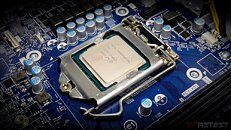Friday, February 14th 2020

Intel Core i9-10900 10-core CPU Pictured
Intel's desktop Comet Lake-S lineup is close to being released and we are getting more leaks about the CPU models contained inside it. Perhaps one of the most interesting points for Comet Lake-S series is that it brings a boost in frequency and boost in core count, with the highest-end Core i9 processors going up to 10 cores. Thanks to Xfastest, a Hong Kong-based media outlet, we have first pictures of what appears to be an engineering sample of the upcoming Core i9-10900 processor.
Being a non-K version, this CPU is not capable of overclocking and has a fixed TDP rating of 65 Watts. Compared to 125 W of the K models like the upcoming Core i9-10900K, this CPU will output almost half the heat, thus requiring a less capable cooling solution. The CPU is installed in LGA1200 socket, which is a new home for Comet Lake-S CPUs and provides backward compatibility for coolers supporting LGA1151. In the sample processor pictured below, we can see a marking on the CPU that implies 2.5 GHz base clock. Previously rumors were suggesting that this CPU version has 2.8 GHz base clock, however, it can be an early engineering sample given that no official imprints are found on the CPU heat spreader.
Source:
VideoCardz
Being a non-K version, this CPU is not capable of overclocking and has a fixed TDP rating of 65 Watts. Compared to 125 W of the K models like the upcoming Core i9-10900K, this CPU will output almost half the heat, thus requiring a less capable cooling solution. The CPU is installed in LGA1200 socket, which is a new home for Comet Lake-S CPUs and provides backward compatibility for coolers supporting LGA1151. In the sample processor pictured below, we can see a marking on the CPU that implies 2.5 GHz base clock. Previously rumors were suggesting that this CPU version has 2.8 GHz base clock, however, it can be an early engineering sample given that no official imprints are found on the CPU heat spreader.


106 Comments on Intel Core i9-10900 10-core CPU Pictured
Remain gaming king and add MT performance. If only I could use my current Z390 mobo.
This will not kick butts in gaming as 9900k O.C. is already slower than 8086k O.C. in gaming.
.. but better than not reaching it and causing a stink?this. Its early.. and people will post and believe anything.because now, few people need that many cores and is still 'improvement'over 9700k.
For pure gaming performance we already see regression from 8086k now.Intel brought Thermal Velocity Boost to desktop. On laptop TVB means the rated maximum boost will only work if temperature is lower than 50 degrees Celsius.
So yes it is a much shorter than a blink of an eye.First you can not use z390 as the socket is different (LGA1200).
Second 9900k is 50% slower than 8086k in PUBG when both overclocked to 5GHz and run 4000MHz DDR4. More core means higher ring bus latency and less RAM performance.
My friend already got this CPU last year and told me to ignore this gen as they performed badly in games.
BTW I do not know the TVB temperature for desktop. It might not be the same 50 degrees as laptop TVB now.
I hate this hyper train for Intel 14nm refresh when people already knows 9900k is slower than 8086k in multiple games. Adding 2 cores will only make it worse.
9900KS > everything else gaming. Yes even the 8086k. The 9900k/ks have higher clock ceilings. I'm running a 9900k myself at 5.2GHz all-core, 24/7.
Turning HT off on the current gen of chips yields pretty dramatic temperature differences and allows for a 200-300mhz higher OC as a result.
It's pretty common to see a 9700K at 5.2 beating a 9900K at 5.0 in games/non-heavily threaded loads while consuming less power.
Isn't the whole idea of buying a hyperthreaded CPU to have more threads? :rolleyes:
www.purepc.pl/procesory/test_procesora_intel_core_i5_8600k_rzeznik_zwany_coffee_lake?page=0,36
Brings me back to the days when more VRAM was better and Pentium 4 was better than Athlon XP/64 because of the higher clock speed.. :laugh:
We said it about the Q6600 (oh get that quad in the future games will use more cores) - but dual cores were still the best for gaming, then the 1060T Phenom then 2600K, r7 1700, etc. etc. - basically 4 c / 4t thread CPUs really only started to show real limits in 2015, with the i5 4t still being the optimal gaming choice. Right now 6t is starting to show it's age, but I think it will be another few years before 8t/10t/12t starts to really limit anything, by then you're on to more cores and completely different tech anyways.
You may be right though - the 9700K is a little weird with it's frame pacing and sometimes has issues in some games due to the high performing core/ low thread count combo (red dead, GTA 4, farcry 5).